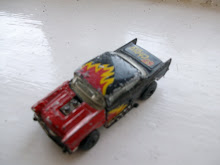Not too long ago, I had the misfortune to see the first episode of the remake of classic 60s show 'The Prisoner'. Disclaimer: I'm a huge fan of the original. With this in mind, perhaps I was always going to be disappointed.
For starters, if using the horrific plot device of insomnia wasn't bad enough, they choose an actor with the charisma of my microwave to act as the hero. Perhaps it improved over the series, but life is too short for me to investigate without some glowing references from people I trust.
Instead, I'd much rather watch the original series again. The product of the, frankly barking, mind of Patrick McGoohan, it requires the watcher to pay attention and fill in the gaps for themselves. We're never told who the main character is: only that he is a agent of some kind who resigned from his post for reasons unknown. Captured and taken to the surreal and sinister Village, where every citizen has numbers rather than names (our man being 'Number Six'), he faces constant attempts to break him and find his reasons. His interactions with other members of the village are undercut with doubt on who he can trust.
Unlike the remake, most episodes featured a different actor as Number Two, charged with breaking Six. This allowed McGoohan's character occasional victories, as while he might not escape the village, he resists attempts to destroy his stubborn individuality and make him a contented member of the community. This meant we get to see (at the time) weird ideas such as dream manipulation, personality transplants and using mind altering drugs as a form of integration.
A favourite #2 of mine was Leo McKern's, who cheerfully admits he's just as much a prisoner as six, and returns at the close of the series to execute "Degree Absolute", all of which leads to the insanity of the finale, which features machine guns, the Beatles, a judge and either all the answers or none at all, depending on your viewpoint.
In the years afterwards, McGoohan was always reluctant to explain just what the Prisoner was supposed to mean, firm in the belief that the scripts said everything. He was right, of course. In some interviews, he stated a belief that humanity was moving too quickly into the future, reflected in the penny farthing bicycle motif throughout the show. I've never totally agreed with the man on this one, technophile that I am, but the ideas of constant surveillance and eroding of individuality have remained pertinent ones 40 years on.
McGoohan spent the rest of his career somewhat in the shade of the legacy of the Prisoner, though I thought he was excellent as two sadistic authority figures in 'Escape From Alcatraz' and 'Braveheart'. He was also a good enough sport about his legacy to provide a wonderful cameo in the Simpsons episode 'The Computer Wore Menace Shoes', showing him still a prisoner but creating an escape vessel made from toilet rolls, plastic forks and scabs.
The best thing that can be said about remakes is that no matter what anyone says, they don't sully the qualities of the original. I've got the DVDs and can watch them anytime and they'll remain as fascinating and brilliant to watch as before.
Subscribe to:
Post Comments (Atom)

No comments:
Post a Comment